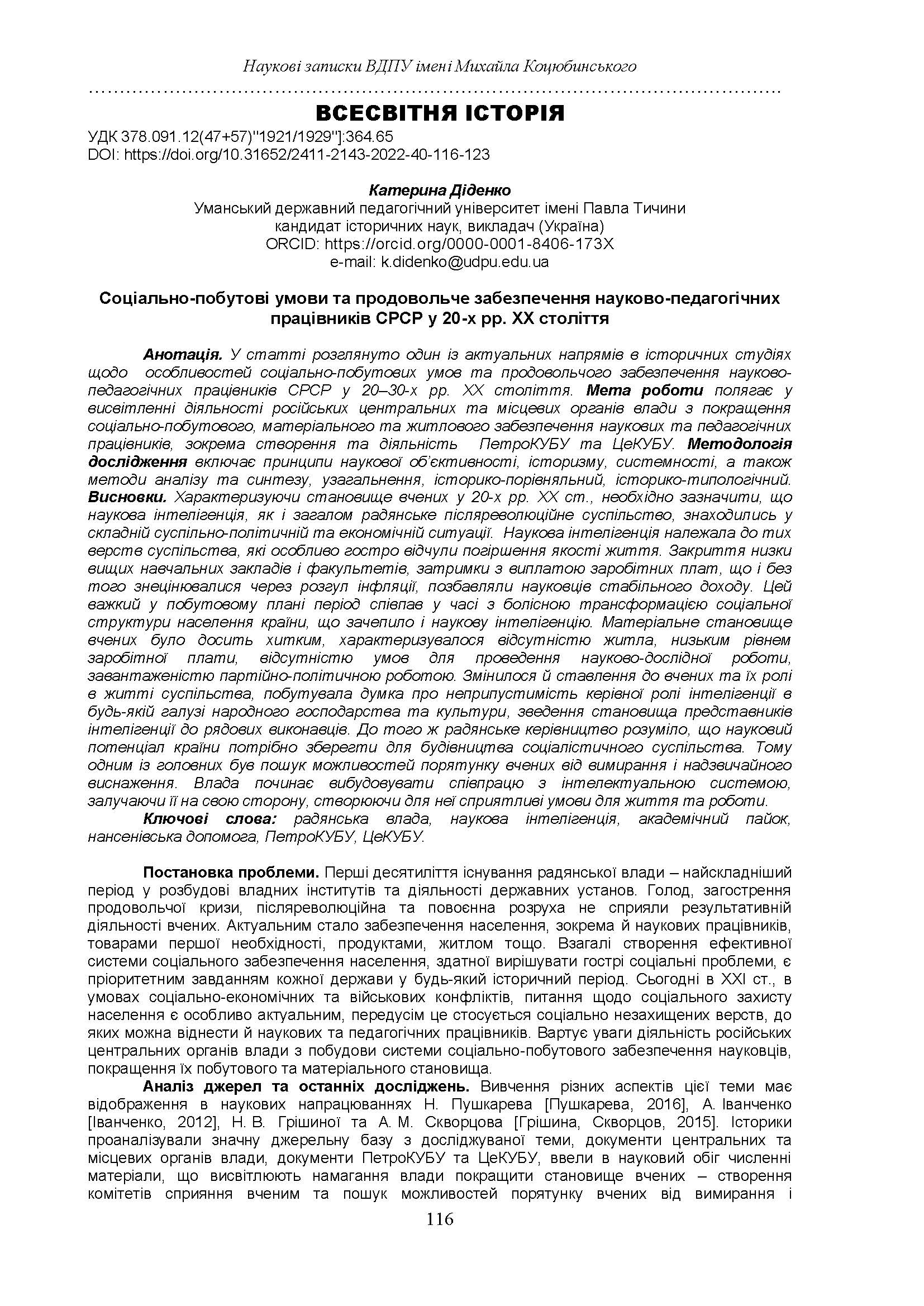Abstract
Introduction. The article considers one of the topical trends in historical studies on the peculiarities of social and living conditions and rations of researchers and educational workers of the USSR in the 20-30s of the 20st century. Purpose. The purpose of the work is to highlight the activities of Russian central and local authorities to improve the social, material and housing provision of researchers and educational workers, in particular, the establishment and activity of PetroKUBU and TseKUBU. The research methodology includes the principles of scientific objectivity, historicism, systematics, as well as analysis and synthetic, generalization, historical-comparative, historical-typological methods. Conclusion. Describing the position of scientists in the 20s of the 21st century, it should be noted that the scientific intelligentsia, like the Soviet post-revolutionary society as a whole, was in a difficult socio-political and economic situation. The scientific intelligentsia belonged to those strata of society that were especially aware of the deterioration in the quality of life. The closure of a number of higher educational institutions and faculties, delays in the payment of wages, which were already depreciating due to rampant inflation, deprived scientists of a stable income. This difficult period in everyday life coincided with the painful transformation of the social structure of the country's population, which also affected the scientific intelligentsia. The financial situation of scientists was rather precarious, characterized by lack of housing, low wages, lack of conditions for conducting research work, workload of party-political work. The attitude towards scientists and their role in the life of society has also changed, there was an opinion about the inadmissibility of the leading role of the intelligentsia in any branch of the national economy and culture and the reduction of the position of intelligentsia to ordinary staff.
At the same time, the Soviet leadership understood that the country's scientific potential must be preserved for the construction of a socialist society. Therefore, one of the main tasks was to find opportunities to save scientists from extinction and extreme exhaustion. The authority began to build cooperation with the intellectual system, bringing academic staff around to its side, creating favorable conditions to live and work.
References
Абубикерова Э. (2013). Проблемы оплаты труда научно-педагогической интеллигенции вузов Саратова в 1920-х гг. Власть. № 4. 171–173.
Алексеев А. (2009). Товарищество на пайках. Наука. Жовтень, 12–13.
Вишленкова Э. А. (2005) Terra Universitatis: два века университетской культуры. Казань: КГУ, 500 с.
ГАРФ – Государственный архив Российской Федерации.
Гришина Н. В., Скворцов А. М. (2015). Социально-бытовые условия жизни отечественных гуманитариев в 1920-е годы. Вестник Челябинского государственного университета. № 24. 190–196.
Год работы… (1922). Год работы Центральной комиссии по улучшению быта ученых (ЦЕКУБУ) М., Декабрь 1921 г. – декабрь 1922.
Еремеева А. Н. (2015). «Работать приходится очень мало – почти все время уходит на добычу пропитания»: голод 1921–1922 гг. в переживаниях профессоров южнороссийских вузов. Клио. № 12(108). 42–47.
Иванчина А. Г. (2012). Правовое и материальное положение профессорско-преподавательских кадров высших педагогических учебных заведений в 20-е–30-е годы xx века (на материалах среднего поволжья). Известия Пензенского государственного педагогического университета имени В. Г. Белинского. Гуманитарные науки. № 27. 675–677.
Организация науки…(1968). Организация науки в первые годы Советской власти (1917–1925) Сборник документов. Ленинград: Наука, 436 с.
Осокина Е. А. (2013). За фасадом «сталинского изобилия». Распределение и рынок в снабжении населения в годы индустриализации. 1927–1941. М., 291 с.
Пушкарева Н. (2016). Когда зарплаты были большими: материальное поощрение советских учёных в 1921–1953 гг. Российская история. № 6, 69–82.
Пять лет работы…(1927). Пять лет работы Центральной комиссии по улучшению быта ученых при Совете Народных Комиссаров РСФСР (ЦеКУБУ) 1921–1926 гг. Москва: Издание ЦеКУБУ, 56 с.
Федотова А. (2013). Продовольственная помощь казанской профессуре в условиях голода 1921–1922 гг. ХХ век: Страницы истории. № 3–4. 53–60.
Хабибрахманова О. А. (2008). Властные стратегии и тактики по улучшению качества жизни научной интеллигенции 1920–1930х годов. Казань, 116 с.
Шальнев Е. В. (2010). Организация Комиссии по улучшению быта ученых. Научный вестник / Под ред. Л. Ю. Федосеевой. Пенза: ГУМНИЦ, 125 с.
Шесть месяцев работы…(1921). Шесть месяцев работы Центральной Комиссии по улучшению быта ученых при Совете Народных Комиссаров (ЦеКУБУ) Краткий отчет. М., 255 с.

This work is licensed under a Creative Commons Attribution 4.0 International License.
Copyright (c) 2022 Катерина Діденко





